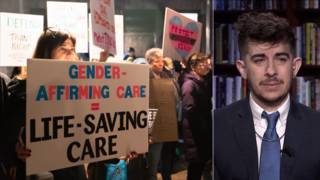
By Amy Goodman & Denis Moynihan
Transgender Day of Remembrance falls annually on Nov. 20. Gwendolyn Ann Smith launched the commemoration in 1999, to remember Rita Hester, murdered a year earlier, and Chanelle Pickett, murdered three years before that. “No one I spoke with then knew who Chanelle Pickett was,” Smith reflected a dozen years later. “It seemed clear to me then that we were forgetting our past, and were — to paraphrase George Santayana — doomed to repeat it.” She launched “TDoR” to ensure that victims of anti-transgender violence weren’t forgotten, and to raise awareness of these hate crimes.
In addition to mourning those who have been killed, trans activists and allies have organized “Trans Awareness Week” to precede the Day of Remembrance. As the advocacy group GLAAD describes it, the week is intended to spur “action … by educating the public about who transgender people are, sharing stories and experiences, and advancing advocacy around the issues of prejudice, discrimination, and violence that affect the transgender community.”
The violence is extreme. The organization Transrespect versus Transphobia Worldwide tracks attacks on transgender people, publishing its Trans Murder Monitoring report annually to coincide with the Day of Remembrance. From Oct 1, 2018, through Sept. 30, 2019, they documented 331 murders of trans and gender-diverse people around the world. Countries with the highest number of murders in the report were Brazil with 130, Mexico with 63 and the United States with 30. Overall, since 2008, when consistent documentation of these murders began, there have been 3,314 murders of transgender and gender-diverse people worldwide. Of the 22 victims this calendar year recorded in Human Rights Campaign’s report, “A National Epidemic: Fatal Anti-Transgender Violence in the United States in 2019,” just released this week, 91% were African American women, 81% were under the age of 30, and 68% were in the South.
Layleen Cubilette-Polanco, a transgender woman, died in New York City’s notorious Rikers Island in June after she was arrested on misdemeanor charges, then jailed, unable to afford $500 bail. Placed in solitary confinement, she died from epilepsy that was exacerbated, her family says, by the neglect of jail officials. Chynal Lindsey was murdered in June and dumped in White Rock Lake in Dallas, one month after Muhlaysia Booker was murdered in the same city. Booker’s murder came a month after a video went viral, showing her being beaten by a mob. Both victims were transgender African American women, and in both cases suspects have been arrested. Booker’s main assailant in the April assault video was also arrested, convicted and sentenced to 300 days in jail.
A 25-year-old transgender Salvadoran woman named Johana Medina Leon died four days after being released from almost two months in Immigration and Customs Enforcement custody, during which she suffered steadily failing health. Her death exemplifies the intersectional array of prejudices and complex challenges transgender people of color confront on a daily basis.
“Every time a trans woman, particularly a trans woman of color, dies, it is like you’re always in anxiety, you’re always in the lived reality that you could be next,” longtime transgender rights activist Lala B Zannell said on the “Democracy Now!” news hour.
Describing this year’s Day of Remembrance, she continued, “A lot of trans folks are reclaiming this space and reclaiming this moment, because we’ve had such a hard year with this [President Donald Trump’s] administration. We’re really trying to curate events that are places of healing and places that are not trauma for trans folks.”
A key goal of TDoR and its preceding awareness week is to engage allies in the movement to end discrimination and violence. Lala B explained: “The best way for you to combat that is for you to show up for trans folks, to call out transphobia … to not misgender trans people, to honor and protect the ones that are in your neighborhood, to tell schools that you don’t mind that trans folks go there, and they need safe spaces to go to the bathroom, and they’re allowed to play in sports, and they’re allowed to go to the prom as their authentic selves. You show up to your job, and you say: ‘We’re going to hire trans people. We’re not going to allow transphobia. We’re not going to discriminate against people.’
“And when you see violence happening, you don’t just pull out your phone and record, but you actually don’t be a bystander, end the violence against trans women of color.” Lala B Zannell’s last call to action, to intervene in an ongoing attack, requires the most courage. But this is the commitment it will take to end this growing scourge of violence against transgender and gender-nonconforming people.












Media Options